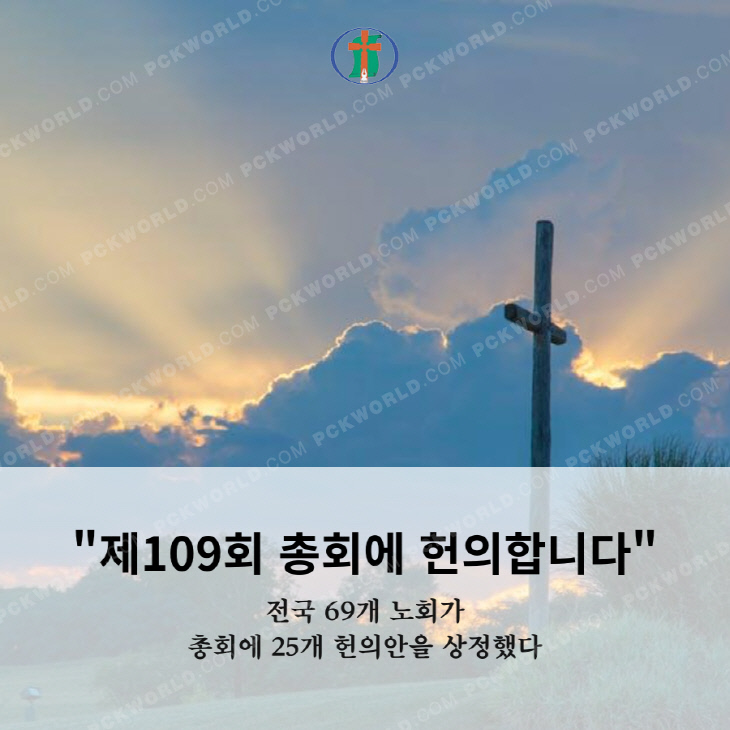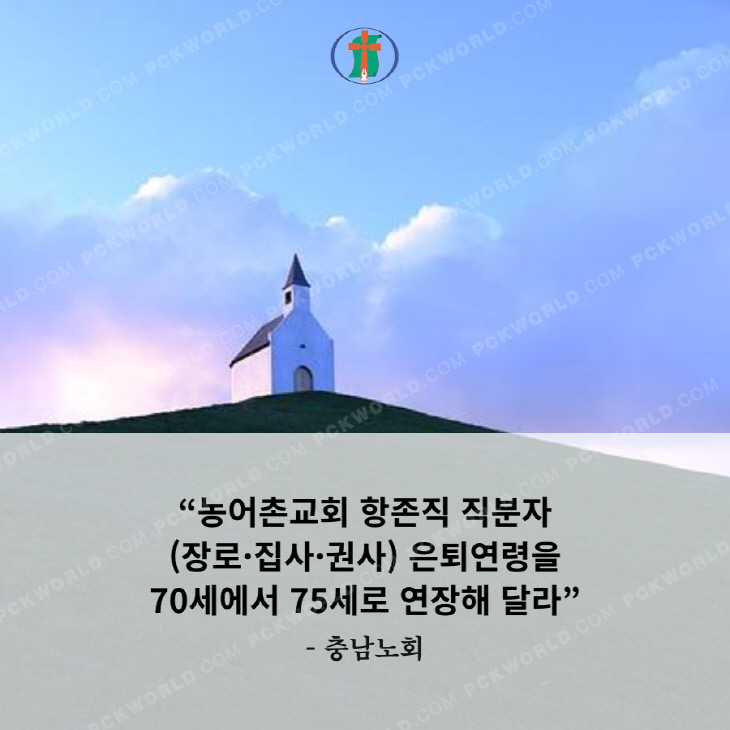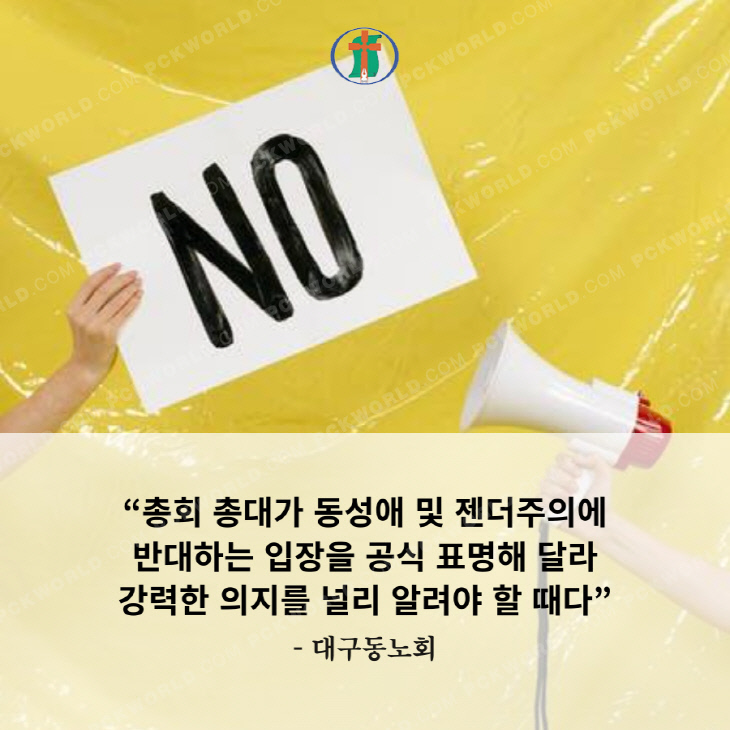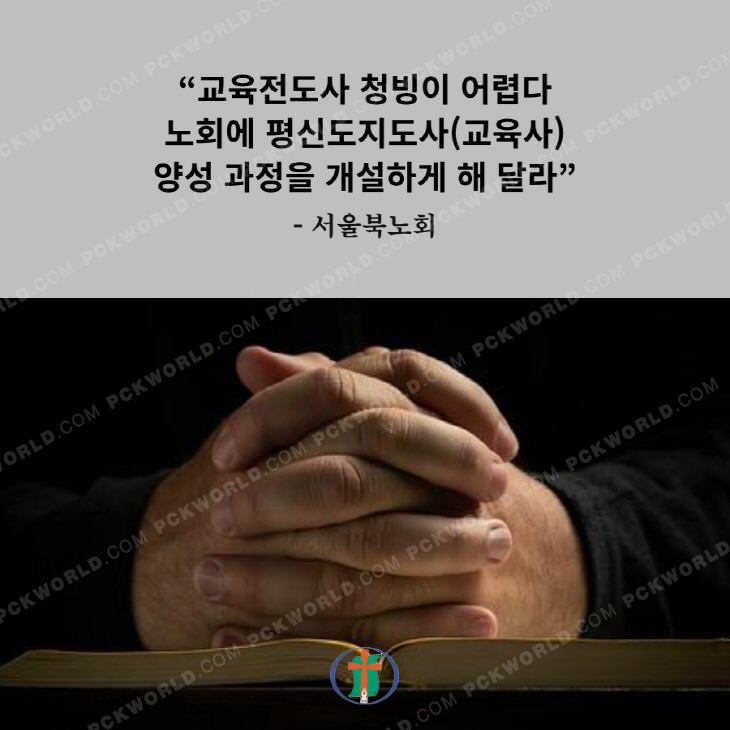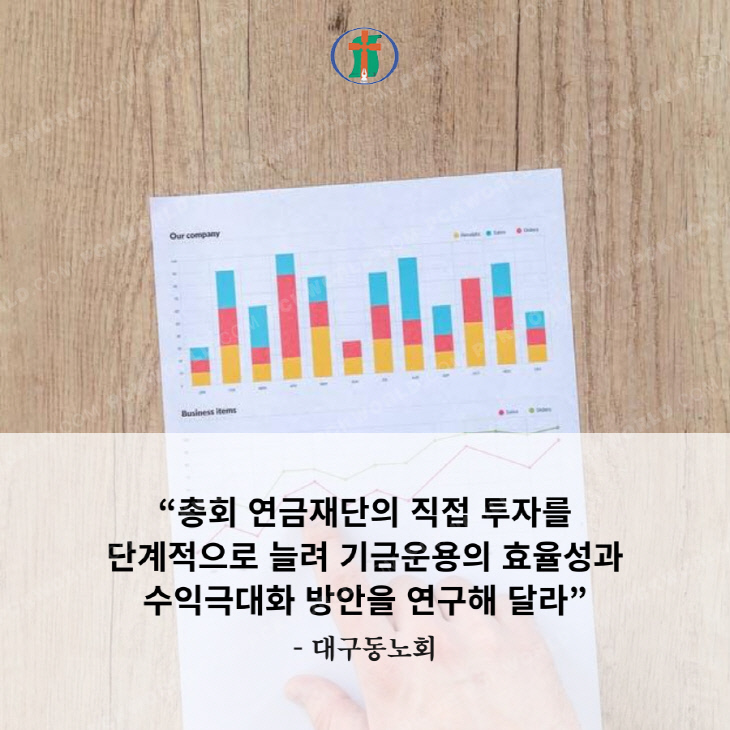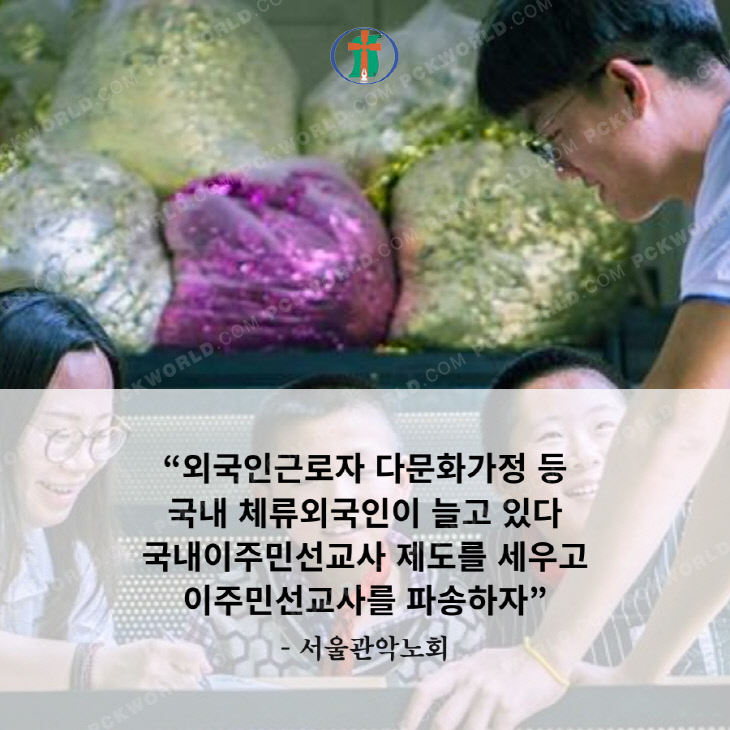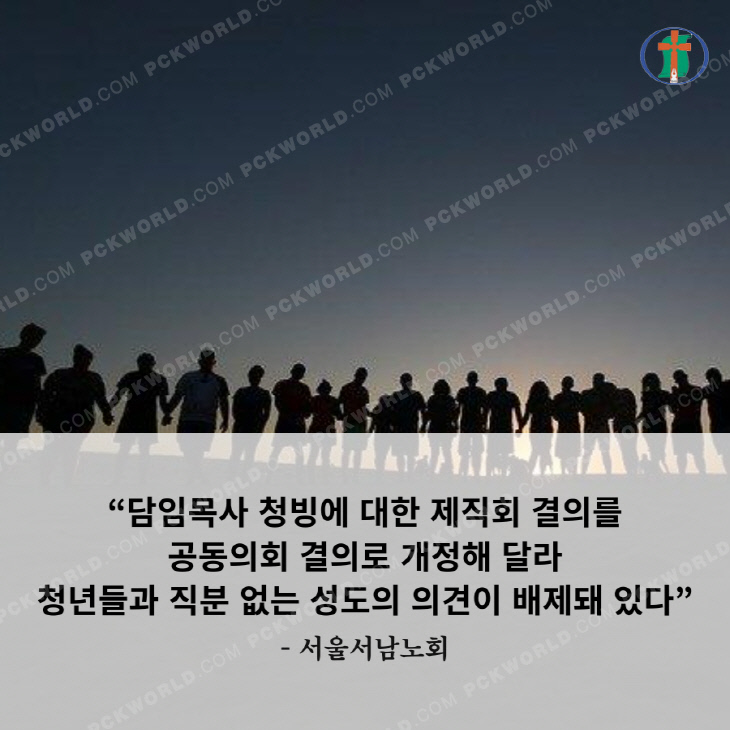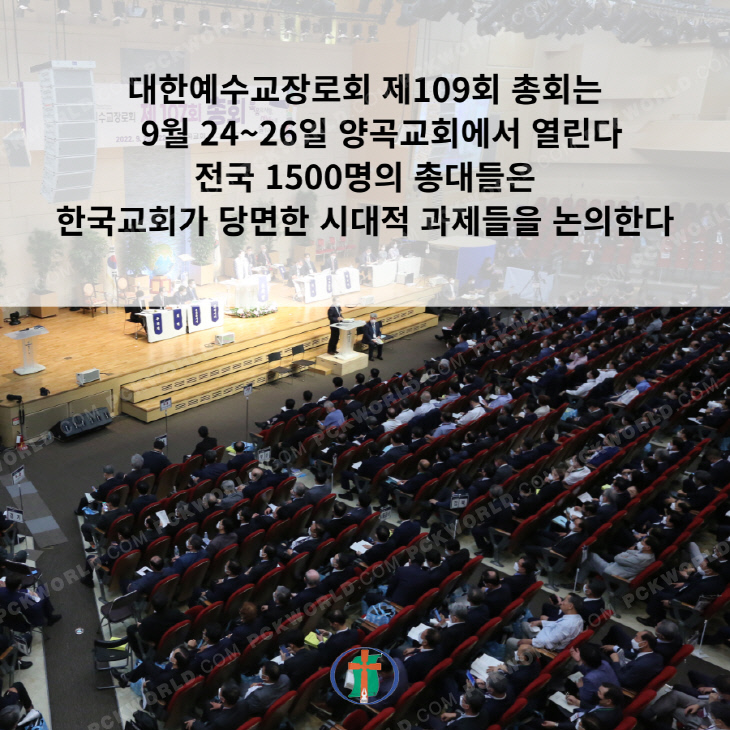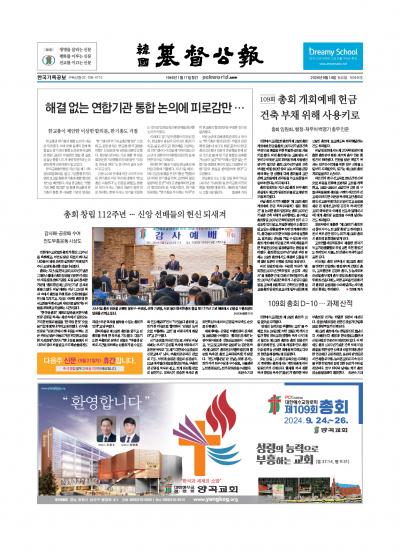[ м„ көҗ ] 21м„ёкё° мғҲлЎңмҡҙ м—җнҒҗл©”лӢҲм№ј мҡҙлҸҷмқ„ мң„н•ң м„ңмҡёкөӯм ңнҳ‘мқҳнҡҢ м„ м–ёл¬ё
21м„ёкё° мғҲлЎңмҡҙ м—җнҒҗл©”лӢҲм№ј мҡҙлҸҷмқ„ мң„н•ң м„ңмҡёкөӯм ңнҳ‘мқҳнҡҢ м„ м–ёл¬ё <м „л¬ё>
(2008л…„ 11мӣ” 15-18мқј, м„ңмҡё)
"л•…кіј кұ°кё°м—җ 충л§Ңн•ң кІғкіј м„ёкі„мҷҖ к·ё к°ҖмҡҙлҚ°м—җ мӮ¬лҠ” мһҗл“ӨмқҖ лӢӨ м—¬нҳёмҷҖмқҳ кІғмқҙлЎңлӢӨ"(мӢң24:1)
н•ҳлӮҳлӢҳмқҳ м„ёкі„(мҳӨмқҙмҪ”л©”л„Ө)м—җ кұ°н•ҳлҠ” м№ңм• н•ҳлҠ” м№ңкө¬л“Өкіј лҸҷм—ӯмһҗл“Өм—җкІҢ мҡ°лҰ¬ мЈј мҳҲмҲҳ к·ёлҰ¬мҠӨлҸ„мқҳ мқҙлҰ„мңјлЎң л¬ём•Ҳл“ңлҰ°лӢӨ.
м—җнҒҗл©”лӢҲм№ј м§ҖлҸ„мһҗлЎң л¶ҖлҰ„ л°ӣмқҖ мҡ°лҰ¬л“ӨмқҖ мқҙ мң„кё°мқҳ л•Ңм—җ м„ңмҡём—җ н•Ёк»ҳ лӘЁм—¬ м—җнҒҗл©”лӢҲм№ј мҡҙлҸҷмқҳ мһ¬нҷңм„ұнҷ”, нҠ№нһҲ м„ёкі„көҗнҡҢнҳ‘мқҳнҡҢ(WCC)мқҳ нҡҢліөмқ„ м„ұм°°н•ҳлҠ” 3мқј лҸҷм•Ҳмқҳ лҢҖнҡҢлҘј к°ҖмЎҢлӢӨ. мҡ°лҰ¬лҠ” л•…кіј кұ°кё°м—җ 충л§Ңн•ң кІғкіј м„ёкі„(oikumene)мҷҖ к·ё к°ҖмҡҙлҚ° мӮ¬лҠ” мһҗл“ӨмқҖ лӢӨ м—¬нҳёмҷҖмқҳ кІғмқҙл©°, н•ҳлӮҳлӢҳмқҳ м„ёкі„м—җм„ң лҸҷм—ӯмһҗмқё мҡ°лҰ¬лҠ” н•ҳлӮҳлӢҳ м•һм—җм„ң мұ…мһ„м Ғмқё мЎҙмһ¬лқјлҠ” к№ЁлӢ¬мқҢм—җ лҸ„лӢ¬н–ҲлӢӨ.
мҡ°лҰ¬лҠ” м§Җкө¬м Ғмқё кёҲмңө мң„кё°к°Җ мқјм–ҙлӮҳкі мһҲлҠ” мғҒнҷ©м—җм„ң л§ҢлӮ¬кі , мқҙ мң„кё°лҠ” мӢңлҢҖмқҳ 징н‘ңлҘј мқҪмңјл Өкі н•ҳлҠ” мҡ°лҰ¬л“Өмқҳ л…ёл Ҙм—җ м§Ғм ‘м ҒмңјлЎң мҳҒн–Ҙмқ„ мЈјм—ҲлӢӨ. нқ”л“ӨлҰ¬лҠ” кёҲмңөкё°кҙҖл“Өмқ„ м§ҖмҶҚмӢңнӮӨкі , м—„мІӯлӮң мӢ мҡ©м •м§Җ мғҒнғңлҘј м№ҳлЈҢн•ҳлҠ” мң мқјн•ң н•ҙкІ°мұ…мқҙ лӢЁм§Җ м •л¶ҖлЎңл¶Җн„° лҚ” л§ҺмқҖ кө¬м ңмһҗкёҲмқ„ л№Ңл Ө мҳӨлҠ” кІғ л°–м—җ м—ҶлҠ” мқҙ мӢңм җм—җ, мҡ°лҰ¬лҠ” мӢ мһҗмң мЈјмқҳ м„ёкі„нҷ” мқҙлҚ°мҳ¬лЎңкё°мқҳ ліём§Ҳм Ғмқё кІ°н•Ёмқҙ мқҙм ң лӘЁл“ мӮ¬лһҢл“Өм—җкІҢ лӘ…л°ұн•ҳкІҢ л“Өм–ҙлӮң кІғмқҖ м•„лӢҢм§Җ 묻лҠ”лӢӨ. мқҙ мӨ‘лҢҖн•ң мӢңкё°м—җ мҡ°лҰ¬ көҗнҡҢл“Өкіј м—җнҒҗл©”лӢҲм№ј кё°кө¬л“ӨмқҖ кёҲмңөкіј н–үм •м—җ мһҲм–ҙм„ң мһҗмң мӢңмһҘ л¬ёнҷ”лҘј л„Ҳл¬ҙ к№ҠмҲҷмқҙ л°ӣм•„л“Өмқҙкі мһҲлҠ” кІғмқҖ м•„лӢҢм§Җ к·ёлҰ¬кі л¬ҙм ңн•ңм Ғмқҙкі м§Җн‘ңмқҳмЎҙм Ғмқё кІҪм ңм„ұмһҘ мқҙлҚ°мҳ¬лЎңкё°м—җ л¬ҙ비нҢҗм ҒмңјлЎң лҸҷнҷ”лҗҳкі мһҲлҠ” кІғмқҖ м•„лӢҢм§Җ 묻лҠ”лӢӨ.
мҡ°лҰ¬лҠ” көӯм ңлІ•мқ„ л…ёкіЁм ҒмңјлЎң л¬ҙмӢңн•ҳл©°, н•өл¬ҙкё°мқҳ мӮ¬мҡ©мқ„ мӨҖ비н•ҳлҠ”, кө°мӮ¬м Ғ м„ёкі„м§Җл°° м „лһөкіј к·ёлҹ¬н•ң мқҙлЎ мқҳ м „к°ңлҘј лҜёкөӯм •л¶ҖмҷҖ к·ё лҸҷ맹мһҗл“Өмқҳ к°ҖмһҘ л¶Ҳкёён•ң нҠ№м§•мңјлЎң ліҙкі мЈјлӘ©н•ҳкі мһҲлӢӨ. мқҙлҹ¬н•ң мғҒнҷ©м—җм„ң мҡ°лҰ¬лҠ” мҡ°лҰ¬мқҳ көҗнҡҢл“Өкіј м—җнҒҗл©”лӢҲм№ј кё°кө¬л“Өмқҙ, м „мҹҒмқҳ к°ҖмһҘ нҒ° н”јн•ҙмһҗлҠ” мӢңлҜјл“Ө, нҠ№лі„нһҲ м—¬м„ұкіј м•„мқҙл“ӨмқҙлқјлҠ” м җмқ„ кі л Өн•ҳл©ҙм„ң, м–ҙл–Ө нҳ•нғңмқҳ м „мҹҒлҸ„ 분мҹҒмқ„ н•ҙкІ°н•ҳлҠ” мҲҳлӢЁмңјлЎң мӮ¬мҡ©лҗҳм–ҙм„ңлҠ” м•ҲлҗңлӢӨкі л§җн• мӨҖ비к°Җ лҗҳм–ҙ мһҲлҠ”м§ҖлҘј 묻лҠ”лӢӨ. лҳҗн•ң м§Җкө¬мҳЁлӮңнҷ”мҷҖ мғқнғңмң„кё°лЎң кұ°лҢҖн•ҳкІҢ л°Җл ӨмҳӨлҠ” лҢҖмһ¬м•ҷм—җ лҢҖн•ҙ мҡ°лҰ¬к°Җ м–ҙл–»кІҢ кёҙкёүн•ҳкІҢ лӘЁл“ лҢҖмқ‘мқ„ н• мҲҳ мһҲмқ„м§ҖлҘј 묻лҠ”лӢӨ.
м§ҖкёҲ, мҡ°лҰ¬лҠ” м„ёкі„көҗнҡҢнҳ‘мқҳнҡҢк°Җ лӢ№л©ҙн•ҳкі мһҲлҠ” мң„кё°м—җ лӢ№нҳ№к°җмқ„ лҠҗлҒјкі мһҲмңјл©°, лҳҗн•ң WCCлҘј мң„н•ң мғҲ л№„м „кіј мғҲ л°©н–Ҙк°җк°Ғмқҙ н•„мҡ”н•Ёмқ„ лҠҗлҒјкі мһҲлӢӨ. к·ёлҹ¬лӮҳ мқҙлІҲ лӘЁмһ„мқҳ мЈјмҡ”лӘ©м ҒмқҖ мҡ°лҰ¬ лӘЁл‘җк°Җ 섬겨мҷ”кі м•һмңјлЎңлҸ„ мӮ¬лһ‘н• , м„ёкі„көҗнҡҢнҳ‘мқҳнҡҢмқҳ нҳ„ мғҒнғңлҘј лҶ“кі л…јмҹҒмқ„ н•ҳл ӨлҠ” кІғмқҙ м•„лӢҲлқј, м—җнҒҗл©”лӢҲм№ј мҡҙлҸҷмқ„ мһ¬нҷңм„ұнҷ”н•ҳкі мқҳлҜё мһҲлҠ” лӘ©н‘ңл“Өмқ„ м„ёмӣҢк°Җкё° мң„н•ҙ н•Ёк»ҳ мғҲ л№„м „мқ„ м°ҫмңјл ӨлҠ” кІғмқҙлӢӨ.
мқҙлҹ¬н•ң кҙҖмӢ¬мқ„ л§ҲмқҢм—җ лӢҙм•„ мҡ°лҰ¬лҠ” м•„лһҳмҷҖ к°ҷмқҙ м„ м–ён•ңлӢӨ.
1. мҡ°лҰ¬лҠ” WCCмқҳ мҳҲм–ёмһҗм Ғ мӮ¬м—ӯмқ„ мІңлӘ…н•ңлӢӨ.
WCCлҠ” мһҗмӢ мқ„ көҗнҡҢмқҳ м№ңкөҗмҷҖ к°ңмІҷмһҗм Ғ мҡҙлҸҷмқҙлқјкі к·ңм •н•ҙмҷ”лӢӨ. WCCлҠ” м–ҙл Өмҡҙ л•ҢлҘј л§ҢлӮ л•Ң л§ҲлӢӨ мӢңмқҳм Ғм Ҳн•ң м„ұлӘ…мқ„ л°ңн‘ңн•ҳкі көҗнҡҢлҘј мқёлҸ„н•ҳлҠ” кІ°м •м Ғмқё н–үлҸҷмқ„ м·Ён•ҙ мӨ„ кІғмқ„ мҡ”мІӯл°ӣм•ҳлӢӨ. к·ёлҹ¬н•ң мҳҲм–ёмһҗм Ғ мӮ¬м—ӯмқ„ мӢӨмІңн•Ём—җ мһҲм–ҙм„ң, нҳ„мһ¬ мӮ¬мҡ©лҗҳкі мһҲлҠ” мқҳмӮ¬кІ°м •м—җм„ң м—¬лЎ н•©мқҳ(Consensus) л°©мӢқмқҙ WCCмқҳ мҳҲм–ёмһҗм Ғ мӮ¬м—ӯмқ„ л¬ҙл””кІҢ н•ҳкі мһҲм§ҖлҠ” м•ҠмқҖм§Җ мғқк°Ғн•ҳкІҢ лҗңлӢӨ. мҡ°лҰ¬лҠ” мҳҲм–ём Ғ мҶҢлҰ¬лҠ” к°Ғмһҗмқҳ нҳ„мһҘ м•Ҳм—җм„ң мҳ¬л°”лҘҙкІҢ нҸүк°Җлҗ мҲҳ мһҲлӢӨлҠ” мӮ¬мӢӨмқ„ мқёмӢқн•ҳл©ҙм„ң мқҙ л¬ём ңлҘј м ңкё°н•ңлӢӨ. мҡ°лҰ¬лҠ” WCCк°Җ м„ұл №мқҳ мҳҲм–ёмһҗм Ғ мҶҢлҰ¬лҘј м§ҖмҶҚм ҒмңјлЎң к№ЁлӢ¬мқ„ мҲҳ мһҲкё°лҘј мҡ”мІӯн•ңлӢӨ.
2. мҡ°лҰ¬лҠ” м•„к°ҖнҺҳ л¬ём„ң(AGAPE: alternative globalization addressing people & earth)мҷҖ к·ёкІғмқҙ м§ҖлӢҢ мҳҲм–ёмһҗм Ғ м Җн•ӯмқҳ мӮ¬лӘ…мқ„ м§Җм§Җн•ңлӢӨ.
мҡ°лҰ¬лҠ” м§ҖлӮң нҸ¬лҘҙнҶ м•Ңл Ҳк·ёл Ҳ(Porto Alegre) WCC мҙқнҡҢк°Җ мқҙ л¬ём„ңм—җ лҢҖн•ҙ 진м§Җн•ҳкІҢ л…јмқҳн• мҲҳ мһҲлҠ” кё°нҡҢлҘј м ңкіөн•ҳм§Җ м•Ҡкі , нҠ№лі„нһҲ мӢ мһҗмң мЈјмқҳ м§Җкө¬нҷ”мҷҖ м ңкөӯмқҳ мҙқмІҙм Ғмқё мІҙм ңл“Өм—җ м Җн•ӯн•ҳлқјлҠ” к·ё мҡ”мІӯм—җ мЈјмқҳн•ҳм§Җ м•ҠмқҖ кІғмқ„ мң к°җмңјлЎң мғқк°Ғн•ңлӢӨ. к·ё л¬ём„ңмқҳ лӘЁл“ мқҙмҠҲлҠ” "нҸӯл Ҙк·№ліө 10л…„"(DOV: the Decade to Overcome Violence) нҷңлҸҷкіј м—°кІ°лҗҳм–ҙм•ј н•ңлӢӨ. м ңкөӯмқҳ кІҪм ңм Ғ, мғқнғңн•ҷм Ғ, кө°мӮ¬м Ғ нҸӯл ҘмқҖ "нҸӯл Ҙк·№ліө 10л…„"мқҙ м§Җм Ғн•ҳлҠ” н•өмӢ¬мқҙкё° л•Ңл¬ёмқҙлӢӨ.
3. мҡ°лҰ¬лҠ” WCCк°Җ көҗнҡҢл“Өмқҳ м№ңкөҗмһ„мқ„ мІңлӘ…н•ңлӢӨ.
WCCмҷҖ нҡҢмӣҗкөҗнҡҢл“Ө мӮ¬мқҙмқҳ м •нҷ•н•ң мҶҢнҶө(COMMUNICATION)мқҖ көҗнҡҢл“Өмқҳ м№ңкөҗм—җм„ң ліём§Ҳм—җ мҶҚн•ңлӢӨ. мқҙлҹ¬н•ң м№ңкөҗлҠ” нҲ¬лӘ…м„ұкіј мғҒнҳём„ұмқ„ н•„мҡ”лЎң н•ҳкі мһҲлӢӨ. мҡ°лҰ¬лҠ” м—җнҒҗл©”лӢҲм№ј лүҙмҠӨ мқён„°лӮҙм…”л„җ(ENI)кіј лӢӨлҘё м ң3мһҗ м–ёлЎ л“Өмқҙ ліҙлҸ„н•ҳлҠ” WCCм—җ лҢҖн•ң н•ҙм„қмңјлЎң мқён•ҙ мһҗмЈј нҳјлҸҷмқ„ кІӘкі мһҲлӢӨ. к·ёлҰ¬кі WCCк°Җ м§Ғм ‘ л§җн•ҳкі мһҲлҠ” кІғмқҖ м ңлҢҖлЎң л“Јм§Җ лӘ»н•ҳкі мһҲмңјл©° лҳҗн•ң WCCк°Җ м–ҙл–»кІҢ нҡҢмӣҗкөҗнҡҢл“ӨлЎңл¶Җн„° к·ёл“Өмқҳ кҙҖмӢ¬мӮ¬м—җ лҢҖн•ҙ мҶҢмӢқмқ„ л“Јкі мһҲлҠ”м§Җ мһҳ лӘЁлҘҙкі мһҲлӢӨ.
4. мҡ°лҰ¬лҠ” WCCмқҳ мһ¬м •м Ғ мҳЁм „м„ұмқҙ ліҙнҳёлҗҳм–ҙм•ј н•Ёмқ„ мІңлӘ…н•ңлӢӨ.
мӢңмһҘ м„ёл Ҙл“Өкіј мһ¬м •м§Җмӣҗ лӢЁмІҙл“Ө(donor agencies)мқҳ мҡ”кө¬л“ӨмқҖ WCCмқҳ мһ¬м •м Ғ мҳЁм „м„ұмқ„ мҶҗмғҒмӢңнӮ¬ мҲҳ мһҲлӢӨ. к·ё мҡ”кө¬л“ӨмқҖ WCCк°Җ мӢңмһҘ м„ёл Ҙл“Өкіј мһ¬м •м§Җмӣҗ лӢЁмІҙл“Өмқҳ мһ…л§ӣм—җ нңҳл‘ҳл Өм„ң кІ°көӯ лҸ…лҰҪм Ғмқё нҷңлҸҷмқ„ н• мҲҳ м—ҶлҸ„лЎқ л§Ңл“Өкё° л•Ңл¬ёмқҙлӢӨ. мқҙм „мқҳ "мқёмў…м°Ёлі„ мІ нҸҗ н”„лЎңк·ёлһЁ"(the Programme to Combat Racism)кіј "к°ңл°ңм—җ лҢҖн•ң көҗнҡҢм°ём—¬ мң„мӣҗнҡҢ"(Commission of the Churches Participation in Development)мқҳ кІҪн—ҳмқҖ мҳҲмӮ°м§Җмӣҗмқ„ к°җмҶҢн•ҳм§Җ м•Ҡкі лҸ„ л…јмҹҒм Ғмқё н–үлҸҷл“Өмқ„ м ңл•Ңм—җ н–үн•ҳл©ҙм„ңлҸ„ мӢӨм ңлЎңлҠ” мӢ м„ н•ң мһ¬м •мһҗмӣҗмқ„ мқҙлҒҢм–ҙ лӮҙм—ҲмқҢмқ„ ліҙм—¬мӨҖлӢӨ. мөңк·јмқҳ мӮ¬лЎҖлЎңлҠ” нҢ”л ҲмҠӨнғҖмқёкіј мқҙмҠӨлқјм—ҳ м•Ҳ м—җнҒҗл©”лӢҲм№ј лҸҷл°ҳмһҗ н”„лЎңк·ёлһЁ, 'лӘёмңјлЎң м“°лҠ” нҺём§Җ' м—°лҢҖл°©л¬ё л“ұмқҙ мһҲлӢӨ. мқҙлІҲ лӘЁмһ„лҸ„ лӘЁл“ мһ¬м •мқ„ м§Җм—ӯкөҗнҡҢл“Өкіј к°ңмқё к·ёлҰ¬мҠӨлҸ„мқёл“ӨлЎңл¶Җн„° м§Җмӣҗ л°ӣм•ҳлӢӨлҠ” мӮ¬мӢӨ м—ӯмӢң н•ң к°Җм§Җ мӮ¬лЎҖлқјкі н• мҲҳ мһҲлӢӨ.
5. мҡ°лҰ¬лҠ” мғҲлЎңмҡҙ м—җнҒҗл©”лӢҲм№ј көҗмңЎмқҳ н•„мҡ”лҘј мІңлӘ…н•ңлӢӨ.
м—җнҒҗл©”лӢҲмҰҳмқҖ м§Җм—ӯ, көӯк°Җ, лҢҖлҘҷ, м§Җкө¬м Ғ м°Ёмӣҗ, лӘЁл“ м°Ёмӣҗм—җм„ң к°•нҷ”лҗҳм–ҙм•ј н•ңлӢӨ. мқҙ мӢңлҢҖмқҳ м—җнҒҗл©”лӢҲмҰҳмқҖ көҗнҡҢл“Өкіј к·ёлҰ¬мҠӨлҸ„мқёл“Өмқҳ нҳ‘мҶҢн•ң кҙҖмӢ¬мӮ¬ к·ё мқҙмғҒмқҳ кІғмқҙлӢӨ. мў…көҗк°„ лҢҖнҷ”, м •мқҳ·нҸүнҷ”·м°ҪмЎ°ліҙм „(JPIC)мқ„ мң„н•ң кіөлҸҷмқҳ нҷңлҸҷл“Өмқ„ нҶөн•ҙ лҚ” л„“мқҖ м—җнҒҗл©”лӢҲмҰҳмқҙ л– мҳӨлҘҙкі мһҲлӢӨ. мқҙлҹ° лҚ” нҸӯл„“мқҖ мқҳмӢқмқ„ м§ҖлӢҢ м—җнҒҗл©”лӢҲм№ј көҗмңЎмқҙ лӘЁл“ м°Ёмӣҗм—җм„ң мҡ”мІӯлҗңлӢӨ.
6. мҡ°лҰ¬лҠ” м§Җм—ӯ м—җнҒҗл©”лӢҲм№ј лӢЁмІҙл“Өкіј нҷңлҸҷмқ„ мІңлӘ…н•ңлӢӨ.
м„ёкі„м Ғ м—җнҒҗл©”лӢҲмҰҳмқҖ м§Җм—ӯ м—җнҒҗл©”лӢҲм№ј лӢЁмІҙл“Өмқҳ м§Җмӣҗкіј лӘЁн—ҳмқ„ н•„мҡ”лЎң н•ңлӢӨ. м§Җкө¬нҷ”, мӢңмһҘм„ёл Ҙ, м ңкөӯмқҳ мӢӨмІҙмҷҖ к°ҷмқҖ м§Җкө¬м Ғ кҙҖмӢ¬мӮ¬л“Өмқ„, к°ҖмһҘ мҳҒн–Ҙмқ„ л°ӣкі мһҲлҠ” мӮ¬лһҢл“Өм—җкІҢ н•ҙм„қн•ҙ мЈјлҠ” кІғмқҖ л°”лЎң м§Җм—ӯ м—җнҒҗл©”лӢҲм№ј лӢЁмІҙл“Өкіј нҷңлҸҷмқҙлӢӨ. WCCмҷҖ к°ҷмқҖ м„ёкі„м Ғ кё°кө¬л“ӨмқҖ мҳҲм–ёмһҗм Ғ мӮ¬м—ӯмқ„ н•Ёк»ҳ н•Ём—җ мһҲм–ҙ м§Җм—ӯкөҗнҡҢмқҳ м§Җмӣҗмқ„ н•„мҡ”лЎң н•ҳл©°, мқҙ мӮ¬м—ӯмқ„ мІңлӘ…н•ҳлҸ„лЎқ көҗнҡҢл“Өмқ„ мқҙлҒҢм–ҙ лӮҙм–ҙм•ј н•ңлӢӨ.
мҡ°лҰ¬лҠ” мқҙ мІңлӘ…л“Өмқҙ мҡ°лҰ¬ мӢңлҢҖмқҳ м—җнҒҗл©”лӢҲм№ј л№„м „мқ„ мғҲлЎӯкІҢ н•ҳлҠ”лҚ° кё°м—¬н• мҲҳ мһҲкё°лҘј кё°лҸ„н•ҳл©ҙм„ң мқҙ м„ м–ём„ңлҘј л°ңн‘ңн•ңлӢӨ.
|
Seoul Statement
on Revitalizing Ecumenical Movement in the 21st Century
The Earth belongs to God and all of its abundance,
and so too the World and all of its inhabitants. (Ps.24:1)
Dear Friends and Co-workers in God’s Oikoumene,
Greetings in the name of our Saviour Jesus Christ!
We are a group of ecumenical leaders who have come together in Seoul, Korea, for a three day consultation to consider the revitalization of the ecumenical movement and of the World Council of Churches in particular at this time of crisis. We meet with the understanding that the earth with all of its abundance and the world (oikumene) with all of its inhabitants belong to God and that as co-workers in God’s oikumene we are accountable to God.
We meet in the context of the ongoing global financial crisis, which bears directly upon our attempts to read the signs of the time. We ask whether the flawed nature of the neo-liberal ideology of globalization is not now obvious to everybody, when the only remedy to a crippling cessation of credit is sought in further borrowing by governments to shore up faltering financial institutions. At this critical time we ask whether our churches and our ecumenical institutions have imbibed too deeply from the culture of the free market in financial and administrative matters and made uncritical accommodations with the ideology of unlimited and exponential economic growth.
We note as a most ominous feature of the US government and its allies the development of the theory as well as the practice of world domination by military means, with explicit disregard for international law and with preparations for the use of nuclear weapons. In this situation, we ask whether our churches and our ecumenical bodies are ready to respond saying that war in all its forms as a means of settling disputes is totally unacceptable, taking into account the fact that it is civilians, especially women and children, who are most at risk. We also ask how we can all respond with appropriate urgency to the looming catastrophe brought on by global warming and the ecological crisis.
At this time, we note with dismay the crisis in the World Council of Churches. We also feel the need for a fresh vision and a new sense of direction for the WCC. The main purpose of this consultation, however, is not to enter into a debate on the present state of an institution we have all served and continue to love, but to seek a refreshed vision together for the revitalizing of the ecumenical movement and to set meaningful goals.
With this concern in mind we make the following affirmations:
1. We affirm the prophetic ministry of the WCC.
The WCC has defined itself as a fellowship of churches and a frontier movement. As such, at critical times, it has been called upon to make appropriate statements and take decisive actions to lead the churches. In exercising its prophetic ministry, we ask whether the consensus method for making decisions as currently exercised would it not blunt the prophetic ministry of the WCC. We pose this question realizing that the prophetic voice is valued in several contexts. So, we call on the WCC to continue to discern the prophetic voice of the Spirit.
2. We affirm the AGAPE (Alternative Globalization addressing people & earth) document and its call to prophetic resistance. We regret that the Porto Alegre Assembly of WCC did not make room in its programme for a serious debate of this document and heed its call to resistance to totalizing systems, particularly neoliberal globalization and empire. The process has gone on to include the challenge of ecological debt. The whole issue needs to be linked to the work of the Decade to Overcome Violence (DOV) so that the economic, ecological and military violence of empire is at the heart of DOV.
3. We affirm the WCC as a fellowship of churches.
Intrinsic to this fellowship is clear communication between the WCC and its member churches. This requires transparency and reciprocity. We have often been confused by the interpretative accounts of the WCC that have appeared in the Ecumenical News International (ENI) and other third party publications and fail to hear what the WCC itself is saying and how it is receiving communications from churches about their concerns.
4. We affirm the financial integrity of the WCC.
Market forces and the demands of donor agencies seem to vitiate the financial integrity of the WCC, making it sway to market forces and the desires of funding agencies so that it is not permitted to act independently. Previous experiences with the Programme to Combat Racism (PCR) and the Commission of the Churches Participation in Development (CCPD) have shown that timely and controversial action without diminishing financial support has in fact brought in fresh financial resources. To cite recent examples we have the ecumenical accompaniment programme in Palestine and Israel and the ‘living letters’ solidarity visits. Our consultation is also a case in point in that we have received from local congregations and individual Christians all the financial resources needed.
5. We affirm the need for renewed ecumenical formation.
Ecumenism as a perspective at local, national, regional and global levels needs to be strengthened. At this time, ecumenism is more than the narrow concern of churches and Christians. There is a wider ecumenism emerging with inter-religious conversations and joint actions for justice, peace and the integrity of creation. Ecumenical formation with this wider consciousness is required at all levels.
6. We affirm local ecumenical organizations and actions.
Global ecumenism needs the support of local ecumenical bodies and ventures. It is these that translate global concerns such as globalization, market forces and the reality of Empire to the people who are most affected. Global bodies such as the WCC need their support in a common prophetic ministry and to draw the churches to affirm this ministry.
We offer these affirmations with the prayer that they may contribute to a refreshing of the ecumenical vision for our time.
|




















